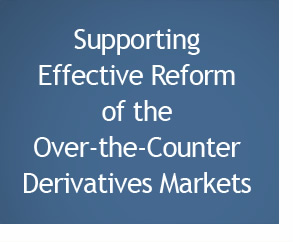06/15/10 - Bloomberg - Matthew Leising and Shannon D. Harrington
|
|
Banks Block OTC Derivatives Clearing in `Proxy War' for Profit, Group Says
Wall Street’s largest banks are blocking smaller firms from using over-the-counter derivatives clearinghouses as a “proxy war” to protect the money they make from trading swaps, according to a brokers’ association.
“The effort to protect clearing, however, is actually a proxy war to limit competition to the incumbent dealers’ $100 billion in profits for derivatives execution.” - Mike Hisler
Rules intended to lessen the risk of a systemwide failure are “working to restrict access to only the incumbent dealers,” the Swaps and Derivatives Market Association said in a statement sent Tuesday to Theo Lubke, senior vice president at the Federal Reserve Bank of New York.
According to Bloomberg News, the group of more than 20 brokers including Jefferies & Co., Imperial Capital LLC and Newedge USA LLC formed in February to lobby Congress and regulators for access to derivatives clearing.
Intercontinental Exchange Inc., CME Group Inc. and other companies that operate clearinghouses for the $615 trillion privately negotiated derivatives markets enforce capital requirements and trading rules intended to bolster the ability of the clearinghouses to withstand losses.
Those requirements, though, prevent all but the world’s largest banks, including Goldman Sachs Group Inc., JPMorgan Chase & Co and Barclays Plc, from sending trades to the clearinghouses, according to the statement by the brokers group.
“The effort to protect clearing, however, is actually a proxy war to limit competition to the incumbent dealers’ $100 billion in profits for derivatives execution,” the brokers group said. Mike Hisler, a spokesman for the association, and Ray Zorovich, the group’s policy assistant, are listed as contacts on the statement.
Hisler also is a partner at New York- based Hexagon Securities LLC, a member of the association.
“Economic Self-Interest”
Clearinghouses should want to offer clearing to as many qualified users as possible to maximize profits, according to the statement.
“However, the clearinghouses are not acting in their own self-interest; they are influenced by the incumbent dealers and are thus acting in the dealers’ economic self- interest.”
Goldman Sachs spokesman Michael DuVally and Barclays spokesman Brandon Ashcraft declined to comment.
JPMorgan spokesman Justin Perras didn’t immediately return a telephone call, Bloomberg writes.
The debate about access takes place as Congress seeks to empower regulators to dismantle failing financial firms deemed to pose a systemic threat to the economy. Limiting the number and types of firms that can join derivatives clearinghouses concentrates too much risk there, the excluded firms say.
At stake is access to the privately negotiated derivatives markets that generated an estimated $28 billion in revenue last year for the five biggest U.S. dealers, Goldman Sachs, JPMorgan, Morgan Stanley, Bank of America Corp. and Citigroup Inc., according to company reports collected by the Federal Reserve and people familiar with banks’ income sources.
Size Requirements
Only firms with a net worth of at least $5 billion are allowed to be members of the largest credit-default swap clearinghouse, Intercontinental Exchange’s ICE Trust. At CME Group’s venture, that requirement is $500 million.
Both demand expertise in the market, including swaps-trading desks that can provide prices for the contracts at the end of the day. Those prices are used to determine margin payments to the clearinghouse.
Smaller brokers should be able to partner with independent dealers to provide end-of-day prices, according to the statement.
Clearinghouses should want to offer clearing to as many qualified users as possible to maximize profits, the group said. “However, the clearinghouses are not acting in their own self‐interest; they are influenced by the incumbent dealers and are thus acting in the dealers’ economic self‐interest.”
“The dealers’ have a circular argument because an actionable pricing requirement only exists because of the lack of an exchange and is merely a temporary solution under the current bilateral OTC market that the dealers themselves are trying to preserve,” the group said.
“Once price transparency is achieved, volumes will migrate to price transparent products and actionable pricing requirements will no longer be needed.” |



